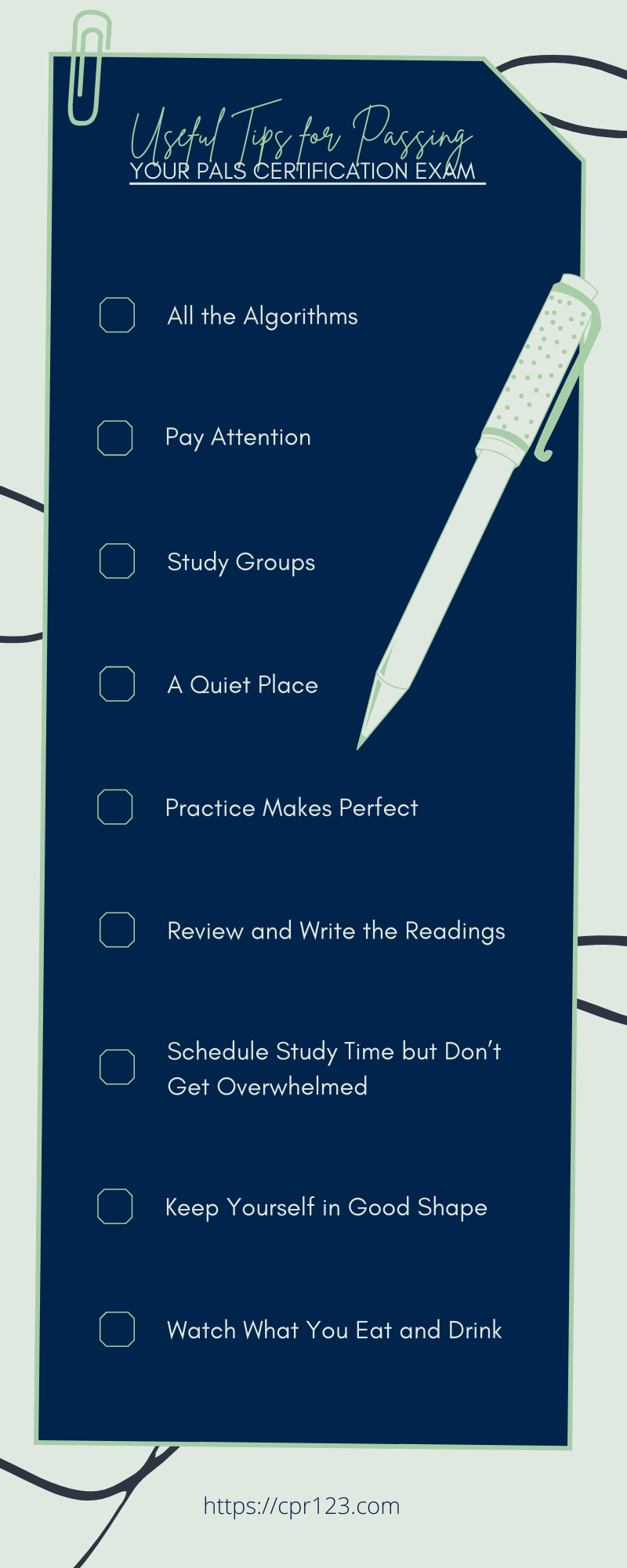Are you going after your Pediatric Advanced Life Support (PALS) certification but have test anxiety? Be at ease. Like any testing, PALS certification is best tackled in a methodical and sensible way. The best preparation is also the simplest, and it’s not always about memorization. Before you proceed, review these useful tips for passing your PALS certification exam.
All the Algorithms
We’ll start with what you’ve already heard many times before. You need to know your PALS algorithms, backward and forwards. PALS algorithms are key to understanding the implementation of PALS protocols when caring for pediatric patients. Memorize and keep them ready to access during the exam and, later, in practice. Most sites recommend memorizing PALS algorithms for pediatric post-resuscitation care, cardiac arrest, tachycardia, bradycardia with pulse and poor perfusion, and a strong knowledge of pediatric basic life support (BLS). Keep these in mind with everything else you do. A good rule of thumb offered by most testing experts is to study two algorithms a day. Set a schedule for which ones to review on what days and stick to it in the weeks before the test.
Pay Attention
Always assume what teachers or professors say will be on the test. Take fastidious and organized notes during the PALS certification course and during any other learning opportunities. If you’re confused about anything, always ask follow-up questions. If an instructor offers office hours, take advantage of them, and schedule a time to talk, but be considerate about the instructor’s time. Classroom PALS courses offer chances to communicate with instructors and others.
Study Groups
Much of your career will involve ongoing learning from and interacting with your peers. It’s an effective way to learn from and challenge one another. If you can gather with your classmates—in person or online—to discuss lessons, share thoughts, and quiz each other, then do so. While you certainly can learn things on your own, if you study with a group, your experience will be all the richer and the testing opportunities will be more unexpected and challenging.
A Quiet Place
You can’t study in chaos and cacophony. Some people may prefer a livelier place to review their lessons, but nothing allows you to focus and tune out the outside world better than a quiet place. (Some examples include a library study carrel or side room.) Naturally, if you’re more comfortable at home, set up an area far from wherever people gather or walk past and make sure there are few to no distractions. Avoid studying in bed, which can encourage naps when things get too quiet! A nice, sturdy desk with good lighting is your best bet for great studying.
Practice Makes Perfect
After studying, do a search online for practice exams and sample tests that evaluate your PALS knowledge and skills. These aren’t official tests, of course, and you should make sure the material covered in the practice tests reflects what you’re learning. Still, there are plenty of tests that simulate the actual exam and should help you to practice, codify, and organize your thoughts before the main event.
Review and Write the Readings
Once you’ve read your way through the textbook, go back and start again. This time, take your time. Highlighting specific passages you’re having trouble understanding. Write them down in a notebook, leaving room to add notes and work out the specifics in your mind. Don’t make this a humdrum exercise where you copy down miles and miles of lines. Focus on the key points and make a mental outline you can summon up during the exam.
Schedule Study Time but Don’t Get Overwhelmed
Define when you plan to study. Look at your calendar and carve out sections of days when you can devote your full attention to studying. For instance, an hour and a half a day is a good chunk of time. Stick to your schedule and protect that time period from any non-emergency events. At the same time, if you’re feeling especially exhausted, overwhelmed, or burned out when study time comes up, take a moment to grab a quick cat nap or meditation break so you can renew your energy. Distracted study is wasted study. Be good about studying but know your limits.
Rest!
We get it. You want to do your best on the exam. But despite the popular idea that pushing yourself to your limits in everything you do is somehow admirable, it’s not a good policy. In between school, work, and the other parts of your life, make sure you’re getting a full seven to eight hours of sleep tonight. Sleep deprivation is scientifically proven to affect your senses, memory, and behavior. Cramming and burning the midnight oil may look impressive, but it eventually subtracts from your performance level. Study when you’re well-rested and get a full night’s sleep before you take the exam.
Keep Yourself in Good Shape
After poring over texts and jotting down notes, you need a dose of fresh air and sunshine to keep your body happy and healthy. Add a bit of exercise to your routine—whether you take a walk or run, ride your bike, visit the gym or fitness center, or find another way to exercise your body after exercising your mind. Staying in shape won’t only improve your health, it’ll give you a more invigorated feeling and keep your mind clear.
Watch What You Eat and Drink
Here’s the last of our useful tips for passing your PALS certification exam: be careful what you put in your body while you study. Caffeine is your friend, but only to a point. Being hyper-caffeinated is a distraction and can cause headaches, jitteriness, nausea, and other physical consequences. A cup of caffeinated coffee or tea is pleasant company, but more than a cup is a crowd. Likewise, while it might be fun to celebrate with a drink after passing the exam, skip alcohol during study time.








